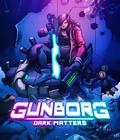Braid, Cave Story, Dust: An Elysian Tale, and Stardew Valley are just a few examples of substantial indie titles that were largely developed by one person. Whether it's the more modern polygonal setup of something like Pumpkin Jack or the pixel stylings of Undertale, knowing that one person is mostly responsible for a game is still a big feat in the modern era, even if we've seen plenty of examples to show that it can be done. Rickard Paulsson is now part of this club with his game Gunborg: Dark Matters, and the result is quite good if you're a fan of what it delivers.
In the slightly nebulous tale, you play a bounty hunter who's been sent off to capture a bunch of outlaws, all of whom seem to be aboard a giant starship. Based on the cut scenes, you know them, and vice versa. However, none of this is explained, so you can easily ignore the narrative without affecting the enjoyment of the overall game.
The game is presented as a classic 2D side-scroller that's simple to understand. Your primary weapon is a powerful sword; you can take down just about any enemy with a few well-timed slashes. Most enemies have guns that can be picked up with limited ammo, and the assortment includes standard laser machine guns, ones with seeking shots, more powerful rifles, and flamethrowers.
From here, Gunborg diverges from others in the genre. For starters, this employs a twin-stick system, which can feel odd due to its rarity. It has the advantage of giving you 360 degrees of shooting and slashing, so it is quite useful. The second difference is that you have a jetpack, and while you can't get sustained use from it, it can give you three boosted jumps once you perform an initial jump, so you can execute a quad jump.
The last addition — and perhaps the most significant one — is your energy shield, which turns out to be a versatile multi-tool. You can naturally use it to block enemy attacks, but it becomes an offensive weapon because every projectile is reflected without losing velocity or damage. The shield can also be used as a melee weapon, and it can move some explosives, so you aren't stuck protecting yourself from the blast. The same goes for environmental hazards, like the purple spiked crystals in most of the levels. The only disadvantages from the shield are the warmup time and the fact that it only lasts about three seconds or three hits, whichever comes first, before it needs to cool down.
The combination of these tools creates a platformer that feels freeform in movement and actions. You're already acrobatic thanks to jetpack boosts, but throw in shield durability, and you're able to weave through tight passageways since you bounce precariously on spikes for a bit before you rely on jumps again. The ability to deflect and respond with gunfire or sword slashes in any direction makes combat feel fantastic, so even the most mundane encounter has you thinking about how to best approach them because you always feel like you're being baited into bigger fights.
Part of this falls on the control scheme, which initially feels unusual but works out with some time. As mentioned before, the game employs a twin-stick setup, which is uncommon in a 2D side-scroller. Unless you map things differently, your shoulder buttons and triggers handle all of the actions, including jumping, shield activation, shooting, and switching weapons. It feels especially strange on the triggers when you're using a sword and activating the shield, but it ensures that you're ready to aim at a moment's notice. One of the more interesting uses of the adaptive triggers is that they stop short if you're trying to fire a gun, so the trigger feels like a button and allows you to quickly fire without wasting movement.
Mastering the moves is a requirement, as Gunborg can be very difficult. Sometimes, that difficulty comes from enemies who choose the perfect time to swarm you. Other times, it comes from the game's transformation from platform shooter to precision platform shooter, often getting combined with the action to create something that requires finger dexterity. The game gives you a certain number of health bars depending on the chosen difficulty level, and you get infinite lives with a generous checkpoint system, but until you are adept at the gameplay mechanics, expect to die often due to your own mistakes.
Gunborg adheres to some retro roots as far as gameplay length. The levels can look lengthy since they're split into several segments, but each one is short enough that the overall level length feels like the classics. The overall difficulty keeps you repeating sections often, but the average playtime is around three hours on normal difficulty. It ensures the title doesn't overstay its welcome, but it can feel like it's over rather quickly when compared to most modern precision platformers and shooters.
If you're the type to shelve a game once you see the end credits, there won't be much here for you. For those who crave replayability, there are level rankings to master. Collecting the robots tucked away in each level is also a side objective to undertake; it's also a useful one since that unlocks a higher difficulty level. That's a decent amount to do if you're into it, or if you're out to polish your skills beyond the newly added Survival mode. Those looking to improve have a good amount to work with.
The presentation is also quite good. The pixel graphics shine for the characters and enemies, making them stand out distinctly from the dark but well decorated backdrops. The animations are crisp, and the frame rate is rock solid, making for a responsive experience that lights up whenever you see any laser fire or crystal spikes on-screen. The sound effects are fine, but the music stands out as being heavily 1980s-inspired sci-fi without necessarily falling into the familiar beats of the time. It sounds fantastic no matter how many times you hear it.
If you're fine with the game's length, Gunborg: Dark Matters delivers the kind of tough, skill-based experience that is currently en vogue. The various tools in your arsenal are enough to get high combos and more powerful attacks, while the controls give you enough precision to make tricky jumps and dance around your enemies. The level design gives you plenty of chances to put those skills to the test, while the high difficulty level feels fair but makes even the easiest difficulty level feel like anything but a cakewalk. If you don't frustrate easily, give Gunborg a try.
Score: 8.0/10
More articles about Gunborg: Dark Matters












 Gunborg: Dark Matters is a slick, retro arcade-style, action-packed platformer where you a take on an army of alien soldiers and killer robots while making your way through a giant spaceship.
Gunborg: Dark Matters is a slick, retro arcade-style, action-packed platformer where you a take on an army of alien soldiers and killer robots while making your way through a giant spaceship.











